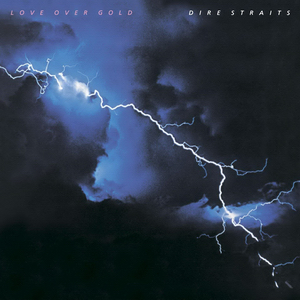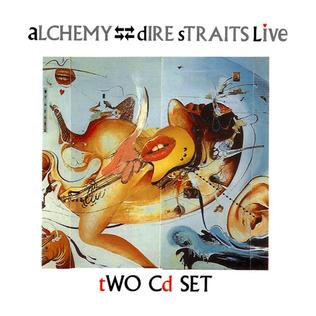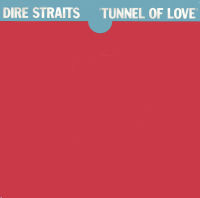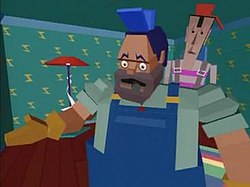
Dire Straits were a British rock band formed in London in 1977 by Mark Knopfler, David Knopfler, John Illsley and Pick Withers. The band was active from 1977 to 1988 and again from 1990 to 1995.

Mark Freuder Knopfler is a British guitarist, singer, songwriter, and record producer. He was the lead guitarist, singer and songwriter of the rock band Dire Straits from 1977 to 1995. He pursued a solo career after the band dissolved, and is now an independent artist.

Dire Straits is the debut studio album by the British rock band Dire Straits, released on 9 June 1978 by Vertigo Records internationally, Warner Bros. Records in the United States and Mercury Records in Canada. The album features the hit single "Sultans of Swing", which reached number 4 on the Billboard Hot 100 chart and number 8 on the UK Singles Chart. The album reached the top of the album charts in Germany, Australia and France, number 2 in the United States and number 5 in the United Kingdom. Dire Straits was later certified double platinum in both the United States and the United Kingdom by the Recording Industry Association of America (RIAA) and the British Phonographic Industry (BPI) respectively.

Brothers in Arms is the fifth studio album by the British rock band Dire Straits, released on 17 May 1985, by Vertigo Records internationally and Warner Bros. Records in the United States. It was the first album in history to sell over one million copies in CD format.

Making Movies is the third studio album by British rock band Dire Straits, released on 17 October 1980 by Vertigo Records internationally, Warner Bros. Records in the United States and Mercury Records in Canada. The album includes the single "Romeo and Juliet", which reached number 8 on the UK Singles Chart, as well as “Tunnel of Love,” featured in the 1982 Richard Gere film An Officer and a Gentleman.

"Sultans of Swing" is a song by British rock band Dire Straits, written by lead vocalist and guitarist Mark Knopfler. The demo of the song was recorded at Pathway Studios, North London, in July 1977 and quickly acquired a following after it was put in rotation on BBC Radio London. Its popularity soon reached record executives, and Dire Straits were offered a contract with Phonogram Records. The song was then re-recorded in February 1978 at Basing Street Studios for the band's eponymous debut album.

Love over Gold is the fourth studio album by British rock band Dire Straits, released on 24 September 1982 by Vertigo Records internationally and by Warner Bros. Records in the United States. The album featured two singles: "Private Investigations," which reached No. 2 on the UK Singles Chart, and "Industrial Disease," which reached No. 9 on Billboard's Hot Mainstream Rock Tracks chart in the United States. The title track was never released as a single, but two years later a live version from Alchemy: Dire Straits Live reached #15 in France, #29 in New Zealand, #43 in the Netherlands and #50 in the band's native United Kingdom. The album reached number one on album charts in Australia, Austria, Italy, New Zealand, Norway and the United Kingdom, as well as number 19 in the United States. Love over Gold was later certified gold in the United States, platinum in France and Germany and double-platinum in Canada and the United Kingdom.

Alchemy: Dire Straits Live is the first live album by the British rock band Dire Straits, released on 16 March 1984 by Vertigo Records internationally, and by Warner Bros. Records in the United States. Recorded at the Hammersmith Odeon in London on 22–23 July 1983, the double album features songs from the band's first four albums, the ExtendedancEPlay EP and Mark Knopfler's Local Hero soundtrack. Many of the songs have reworked arrangements and extended instrumental segments. The album cover is taken from a painting by Brett Whiteley.

David Knopfler is a British musician. Together with his older brother Mark Knopfler, John Illsley, and Pick Withers, he founded the rock band Dire Straits in 1977, serving as rhythm guitarist on their first two albums. After quitting the band in 1980 during the recording of their third album, Knopfler embarked upon a solo career as a recording artist. Knopfler initially created smaller record labels, publishing companies, and indie labels.

"Don't Stand So Close to Me" is a hit song by the British rock band the Police, released in September 1980 as the lead single from their third studio album Zenyatta Mondatta. It concerns a teacher who has a sexual relationship with a student, which in turn is discovered.

On the Night is the second live album by the British rock band Dire Straits, released on 10 May 1993 by Vertigo Records internationally, and by Warner Bros. Records in the United States. The album features many of the band's later hits, including the singles "Walk of Life" and "Money for Nothing". The cover art of the album features dishes of the Very Large Array in central New Mexico.

"Private Dancer" is a song written by British musician Mark Knopfler and recorded by singer Tina Turner, first released in October 1984. The song was intended to be for Knopfler’s band Dire Straits, but was never fully recorded or released by the band. He ended up giving the song to Turner, with her recording being produced by John Carter for her fifth solo album of the same name and released as the album's fifth single. The track reached number seven on the US Billboard Hot 100 and number three on the US R&B chart. The song had moderate international success, reaching number 26 on the UK Singles Chart.

"Money for Nothing/Beverly Hillbillies*" is a song by "Weird Al" Yankovic. It is a cover of "Money for Nothing" by Dire Straits with the lyrics replaced by those of The Beverly Hillbillies theme song. The music video, which appeared as part of Yankovic's film UHF, is a parody of the "Money for Nothing" music video.

"Romeo and Juliet" is a rock song by the British rock band Dire Straits, written by frontman Mark Knopfler. It first appeared on the 1980 album Making Movies and was released as a single in 1981. The song subsequently appeared on the Dire Straits live albums Alchemy and On the Night, and later on Knopfler's live duet album with Emmylou Harris, Real Live Roadrunning. The track was also featured on the greatest hits albums Money for Nothing, Sultans of Swing: The Very Best of Dire Straits, and The Best of Dire Straits & Mark Knopfler: Private Investigations.

"Walk of Life" is a song by the British rock band Dire Straits, being the third track on their fifth studio album Brothers in Arms (1985). It was released as a single in the US in October 1985 and in the UK in January 1986.

Money for Nothing is a greatest hits album by British rock band Dire Straits released on 14 October 1988, featuring highlights from the band's first five albums. The vinyl edition omits the song "Telegraph Road" and has a different running order.

"Private Investigations" is a song by the British rock band Dire Straits from their album Love over Gold. It reached number 2 in the United Kingdom, and is one of their biggest chart successes in the UK. The track has appeared on the compilation albums Money for Nothing and Sultans of Swing: The Very Best of Dire Straits, and is the title track to the more recent 2005 compilation, Private Investigations: The Best of Dire Straits & Mark Knopfler.

"Heavy Fuel" is a song by British rock band Dire Straits from their 1991 album On Every Street. The song was also released as a single and reached No. 1 on the US Billboard Album Rock Tracks chart, making it the band's second song to do so.

"Tunnel of Love" is a song by the British rock band Dire Straits. It appears on the 1980 album Making Movies, and subsequently on the live albums Alchemy and Live at the BBC and the greatest hits albums Money for Nothing, Sultans of Swing: The Very Best of Dire Straits, and The Best of Dire Straits & Mark Knopfler: Private Investigations. The song was also featured in the 1982 Richard Gere film An Officer and a Gentleman and was included in the film’s accompanying soundtrack album.

The Mark Knopfler discography consists of recordings by British singer-songwriter and guitarist Mark Knopfler, not including his work with Dire Straits. Knopfler began recording apart from Dire Straits in 1983, when he released his first soundtrack album Local Hero. That same year he produced his first album, Infidels for Bob Dylan. Between 1983 and 2016, Knopfler composed and released nine soundtrack albums, the last of which was with Evelyn Glennie.





















